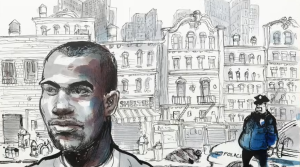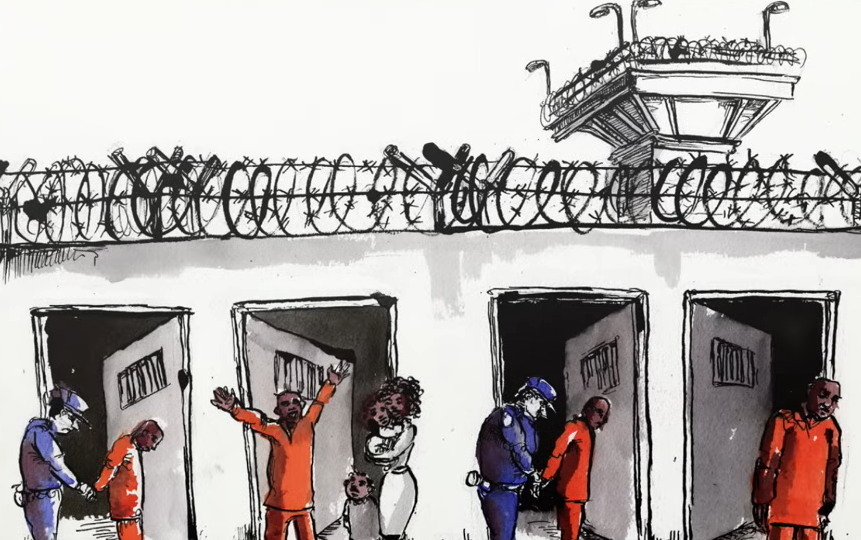By Dr. Brooks Robinson\ Black Economics
Photos: YouTube Screenshots
This essay discusses and answers the following questions: (1) Are criminal justice systems fair? and (2) Are criminal justice systems designed to halt or reduce crime? However, we consider interrelated matters before exploring our new perspective on criminal injustice systems.

Which characteristics differentiate humans from other animals? One such characteristic is our ability to fashion different tools for tasks we confront. Some of our most important and magnificent tools are for building and for transportation. For this essay, we choose building over transportation tools to explore the criminal injustice system.
All highly recognized and great human civilizations are singled out largely because of their ability to construct large and extraordinary edifices. It is not necessary to itemize the civilizations, they and their wonderful structures simply come to mind. This is our starting point because there is a fundamental rule for success in constructing edifices: The foundation must be established perfectly, and each corner and wall must reflect perfect 90- and 180-degree angles, respectively. This must be true from the very bottom of the edifice up to its very top. If a building wobbles, leans, or collapses, it can be traced back to the point of its imperfection.
Consequently, master builders pride themselves in being perfect because they are ever cognizant that, if there is failure, then it will be traced directly to them. If they are fingered as the source of an injury-causing or life-ending imperfection, then their reputation and their livelihood are demolished.
Should not builders be responsible/liable for a collapse that injures or kills? Of course they should be. Their master trainers expended endless hours teaching and reinforcing the knowledge required to build perfectly and successfully. The builders themselves practiced under the watchful eyes of master builders, who handed down expertise. Most importantly, by holding a master builders’ license, they convey to society that they should be paid top dollar for performing construction and that there should be no worries about the quality of completed construction.
Importantly, master builders’ expertise includes not only the science of building itself, but also extensive knowledge of the materials that comprise the constructed edifice. The buck must stop with builders because they are, and should be, viewed as the ultimate cause of construction failures—should they ever occur.
Now to the interrelationship between the nation’s criminal injustice system and builders. When a crime occurs, societal laws, rules, and procedures call for evidence and motives for the crime. This essay reveals that this is an egregious failure of the criminal justice system. Evidence concerns the crime itself and motives are only logical explanations for why the crime occurred. But
what was the cause of the crime? As with building failures (e.g., imperfect builders, training, practices, materials, conditions, etc.), identifying the root cause(s) of crime entails much deeper analysis than just identifying evidence and motives.
Consider, for example, a hypothetical automobile accident that involves violation of a law. Experts quickly identify a physical cause (evidence and motive) for the crime. The equipment malfunctioned; there were unfavorable weather conditions; there was insufficient lighting; the driver fell asleep or was inebriated. But behind each of these “causes” there are more fundamental root
causes.
Did the equipment malfunction because of poor-quality manufacturing? Did the owner not service the vehicle regularly and/or properly? Yes, weather is a daily reality, and everyone knows that inclement weather driving is risky. Was the driver too risk loving? Why? Why was their insufficient lighting? Was the driver not aware that lighting would be poor? Did the driver not recognize the level of body tiredness before embarking on the trip? Of course, we all know that we should not drink and drive. Did the driver not recognize the level of intoxication? Given information concerning
all these factors, what caused the driver to undertake the trip regardless?
Let us suppose that money is the answer. That is, the driver concluded that the trip was an absolute necessity because it was linked to monetary compensation. Why was money-making so important to the driver? Were there pending bills or debt? Suppose the general importance of monetary compensation was planted and reinforced in the mind of the driver at a very early age by a mother, father, brother, sister, grandfather, grandmother, etc. Did the driver grow up in poverty and was conditioned to avoid the shame of poverty by everywhere and always working to earn money.
Was the driver attuned to the fact that the root cause for taking the drive was money or was it such a deep subconscious consideration that it was impossible to hear the internal voice saying: The weather outside is frightful; it is a scary dark and cloudy tonight; I feel like a dead-tired walking zombie; and even though alcohol is a depressant, I will drink just enough to make me “feel good” so
that I can make this trip? However, after knowing the foregoing, we must still answer: “Why was the drive undertaken?” And, as we now know, the driver drove because more money was desired. More money was desired because, in childhood, an idea was planted in the driver’s consciousness concerning the best method for avoiding the shame of poverty (i.e., a form of operant conditioning
occurred)—secure money at all costs.
This essay tells us that we can make every effort to teach drivers to not drive: In inclement weather; when lighting is poor; when too tired; and when inebriated. Yet, the society continues to experience accidents under these very conditions (some of which may be criminal). Why? Because the conditions/reasons given and targeted for correction are not root cause(s) of accidents.
In this case, the root cause was a desire to earn more money.
Now take the foregoing analysis and apply it to fraud, theft, other property crimes, violent crimes including assault and murder, kidnapping, rape, other sex crimes, drug crimes, etc. There is no question that the society has developed extensive expertise in solving these crimes because the solution only requires identifying evidence and motives. But rarely do investigations of crimes seek to pinpoint and reveal the initial and root causal factor(s) that place individuals on the path to criminal activities.

All this places the following realities before us:
• Given the societies’ abundance of psychologists and psychiatrists, those in the criminal justice system must recognize that the system is not truly concerned with reducing and halting crimes—only with identifying and punishing “criminals.” Therefore, in truth, the criminal justice system is not fair if we define fairness as ensuring that causal culprits are identified and dispensed justice properly.
• Those in the criminal injustice system may argue that it is well known that criminal behavior reflects modeling or responding to observed or learned behavior often during early childhood. However, law enforcement has little-to-no purview over events or persons so far removed from the crime itself. Besides, the root cause of the crime may be a mental not a physical phenomenon.
Courts rarely address mental phenomena. Is there any such thing as tangible mental evidence?
• The society is comfortable with its current criminal injustice arrangement because it is a very lucrative arrangement. In other words, while we are reminded perpetually that “crime doesn’t pay,”
the reality is that crime pays handsomely! Ask judges; attorneys; stenographers; detectives; police persons; bailiffs; security guards; those employed to construct courthouses, prisons, and jails; those
employed to manufacture equipment for judicial systems; and employees of a wide range of services industries that support the criminal injustice system.
Taking a somewhat distant perspective, this essay conveys that we continue to experience crime because we fail to address crimes’ root causes. One important reason for not addressing root causes is the absence of “mental evidence.” However, the late, great Robin Williams prepared us for a world of mental evidence in a 2014 movie, The Final Cut. This futuristic movie explored how a microchip with infinite storage capacity was implanted in humans’ brains at birth and recorded the full breadth and scope of their lives. At life’s end, the microchip was removed from the brain and a “cutter” used the content to prepare a condensed biography of the deceased that included the most salient activities and events.
We may be approaching a time when something akin to conditions described in The Final Cut are operational. However, given advancing technology, it should be elementary to review the content of
microchips at any life point—not just at life’s end. In this case, a crime event should warrant a review of the criminal’s microchip to identify the root cause(s) of the criminal behavior. Under these circumstances, it is possible that society can address the true cause(s) of crimes, not just the criminal, who may be a crime victim herself/himself. In other words, society can halt crucifixions of musical conductors because they are not, but composers are, the root cause of awful concerts.
Take caution. A question central to this analysis is: Do humans possess conscious decision-making power (i.e., choices exist for selection) after being “conditioned” to perform certain behaviors? This is a complex question for another day. However, the scientific fields of neuropsychology and neuroeconomics should be able to assist with identifying an appropriate answer.
If experts determine that behavior arises automatically following conditioning without conscious implementation of choice decisions, then it may be safe to conclude that many Black American criminals should not be considered criminals at all.
The broad reality of Black America’s considerably disadvantaged socioeconomic historical starting point, the continuous impact of adverse media stereotypes and conditioning, and epigenetics are among the cruel and powerful causal factors that can produce criminal behavior by Black Americans. In addition, the exploration of Black Americans’ “microchips” may reveal that White societal elites are the root cause(s) of many Black American crimes. And if we go the next analytical step and identify the root cause(s) of important White societal behaviors, we may find that they likely
feature efforts to seize power and preserve controlling positions—meaning money!

Dr. Brooks Robinson is the founder of Black Economics.org website







